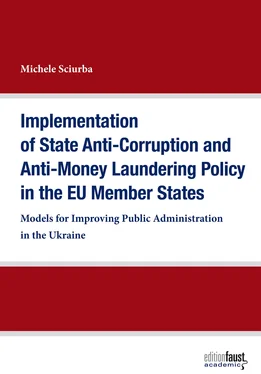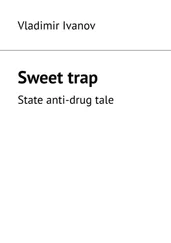Michele Sciurba - Implementation of State Anti-Corruption and Anti-Money Laundering Policy in the EU Member States
Здесь есть возможность читать онлайн «Michele Sciurba - Implementation of State Anti-Corruption and Anti-Money Laundering Policy in the EU Member States» — ознакомительный отрывок электронной книги совершенно бесплатно, а после прочтения отрывка купить полную версию. В некоторых случаях можно слушать аудио, скачать через торрент в формате fb2 и присутствует краткое содержание. Жанр: unrecognised, на английском языке. Описание произведения, (предисловие) а так же отзывы посетителей доступны на портале библиотеки ЛибКат.
- Название:Implementation of State Anti-Corruption and Anti-Money Laundering Policy in the EU Member States
- Автор:
- Жанр:
- Год:неизвестен
- ISBN:нет данных
- Рейтинг книги:4 / 5. Голосов: 1
-
Избранное:Добавить в избранное
- Отзывы:
-
Ваша оценка:
Implementation of State Anti-Corruption and Anti-Money Laundering Policy in the EU Member States: краткое содержание, описание и аннотация
Предлагаем к чтению аннотацию, описание, краткое содержание или предисловие (зависит от того, что написал сам автор книги «Implementation of State Anti-Corruption and Anti-Money Laundering Policy in the EU Member States»). Если вы не нашли необходимую информацию о книге — напишите в комментариях, мы постараемся отыскать её.
This monograph offers a new approach to implementing an anti-corruption strategy in Ukraine and suggests how the fight against corruption within government can be streamlined using modern methods and a risk-based approach. Drawing on the experience of EU countries through a comparative analysis of the rules and procedures for structuring public administration policy, this work proposes developing recommendations to strengthen the Ukrainian anti-money laundering and corruption policy. Corruption remains a widespread problem at various levels within Ukrainian public administration and it has significantly weakened public confidence in government and in the judicial system. In an international comparison of corruption in 180 countries, Ukraine ranks 130th, making it one of the most corrupt countries in the world.
At the same time, Ukraine has an AML/CTF legal administrative framework in place that largely meets the current formal requirements of the FATF. The Ukraine has implemented AML and anti-corruption measures under the Council of Europe's Moneyval monitoring mechanism. In addition, Moneyval has been an associate member of the FATF since 2006. The National Bank of Ukraine (NBU) practices risk-based banking supervision and has made significant progress in creating transparency regarding the beneficial ownership of banks. In recent years, Ukraine has consistently removed criminal owners from the banking sector and established an efficient sanction regime in response to breaches of legal obligations, including the withdrawal of banking licenses. Furthermore, the establishment of a unified state register for beneficial ownership allows authorities to identify banking clients. In terms of mutual legal assistance on money laundering and corruption, the Ukraine has also made significant progress.
Ultimately, the Ukrainian AML/CTF framework has been refined significantly in recent years. Today, there is a clear understanding of money laundering and terrorist financing risks in Ukraine both at the administrative level and at the level of the supervisory authorities. As a result, far-reaching legislation has been established. Nevertheless, this development cannot hide the fact that money laundering via shell companies is still part of everyday life in Ukraine. The Ukrainian criminal justice system continues to be heavily influenced by corruption and has failed to effectively combat it. Ukrainian cross-border prosecution of money laundering offences, in particular the confiscation of proceeds of crime in other countries, is ineffective due to a lack of experience and the absence of legislation spelling out direct areas of responsibility and formal procedures. Finally, a central problem is the lack of confiscation orders which impedes the efficient prosecution of corruption and money laundering.














